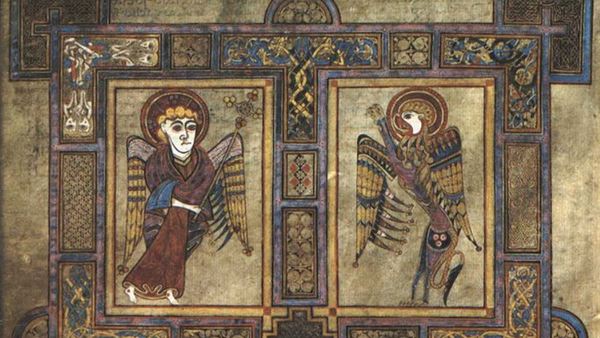Whatever we think of Origen today, his commitment to the Scripture is undeniable. He is known for his allegorical approach to biblical interpretation. Unlike other Christian theologians of his time, he studied the Hebrew language and consulted rabbinic interpretations of the Jewish Scriptures. Yet, beyond these commonly known facts, there was a kind of holistic view of Scripture in Origen (and, as we shall see, in Gregory of Nyssa) that many Christians have since lost in the sands of time. He situated Scripture in the cosmic drama of human existence. For Origen, Scripture is inseparable from the very nature of human beings and their end—participation in the life of God.
This holistic view of Scripture is best elaborated and exemplified in his homily on the Book of Numbers. Yes, Numbers. Origen delivered his homily in response to what he found to be a troublesome trend among Christians of his day—a tendency to discard parts of Scripture that were particularly hard to digest, such books as Leviticus or Numbers. He was concerned that Christians were not reading the whole Scripture, but only that which made up for an easy and pleasant read. He listed the Gospels and other decidedly Hellenistic books (Wisdom, Judith, and Tobit) in the easy read category.
He opens his homily by looking at the multiplicity and multiformity of God’s creation. This world is full of all kinds of animal creatures, all having different forms and functions, requiring other foods to sustain them and ensure their flourishing. Humans are equally diverse; they all have infirmities of their own kind that need appropriate measures to help them achieve health and strength. Finally, there are various stages of development as humans mature from childhood into adulthood; each stage requires appropriate foods and resources to suit their development. This complexity and multiformity of God’s creation, especially in humans, is an essential aspect for Origen as he builds his case for why (and how) Christians should read all Scripture.
Despite such diversity, Origen suggests that there is one thing that unites all humans—their rational nature. In the very opening to his homily, Origen makes a twofold statement, one about the nature of man and the other about the nature of the Scripture. He writes: “Now the true food of a rational nature is the Word of God.”[1] In other words, the Logos speaking through the Scripture is intended to be heard by the rational being; it is precisely for humans.
He calls the Scripture “the Holy Spirit’s writings in the same prologue.”[2] For Origen, there is a sense of intentionality and order placed in the Scripture by the Spirit of God, appropriately corresponding to the rational nature of human beings. Origen insists that Scripture has a weight and volume; it is complex and diverse, just like humans. The diversity and complexity of the Scripture serve the double purpose: the praise and glory of God and nourishment of human beings who fall differently on the continuum of human development. Thus, in the introductory section of this homily, there is a specific vision of human beings, a particular anthropology, evident in Origen’s view of Scripture.
First of all, humans are diverse. There are actual variations in their development, stages of life, and moral and spiritual capacities. Origen feels comfortable in the ambiguity of the world that always operates on different levels at once and does not feel pressured to measure everyone with the same yardstick.
Secondly, humans are rational; they can reason, understand, perceive, and appreciate the divine order. Despite their diversity and various stages of development, humans are subjected to order.
Thirdly, people have not yet assumed the fulness of their human nature; they are still developing and growing into maturity, of which the physical maturation of an individual is just a sign. Human perfection is still in the future, laying beyond their immediate field of vision—a salvation that awaits them in the future.
Lastly, this process of growth in human maturity is characterized by the cooperation between humans and God. In this homily, Origen instructs to pray before reading the Scripture. Here is how he puts it:
What we ought rather to do, is to turn the eyes of our mind toward Him who ordered this to be written and ask Him their meaning. We must do this so that if there is weakness in our soul, He who heals all its infirmities (Ps. 103:3) may heal us, or so that if we are children in understanding, the Lord may be with us guarding His children and may nourish us and add to the measure of our age (Eph. 4:13). For it is in our power to be able to attain both health from weakness and manhood from childhood. It is then our part to ask this of God. And it is God’s to give to those who ask and to open to those who knock.[3]
According to Origen, praying before the reading of the Scripture is an act of the human soul exerting its efforts to grow in maturity and, at the same time, an act of acknowledgment of the order of creation, in which God reveals and we humans receive and follow. Origen further substantiates his point about human cooperation in this development process when he discusses Moses and Aaron’s role in leading people out of Egypt, where Moses represents the knowledge of the divine law, while Aaron represents our human works of developing virtues.
In light of his anthropology, especially his view of the diversity of the human condition and gradual development of the human soul, Origen argues that more complex and challenging books of the Scriptures, far from being useless, are there to contribute to our salvation by helping us grow from stage to stage into maturity, finally reaching God the Father and his splendor. Therefore, there is no place for simple biblicism in Origen’s approach to Scripture. Instead, the Scripture is multi-layered with meaning corresponding to various stages of human development. A person who feeds only on the surface of the scriptural meaning never grows and develops into a mature human being, failing to attain manhood, to use Origen’s metaphor.
Origen’s view of Scripture and its cooperation with human nature was not unique to him. It was more common among early Church Fathers, from Irenaeus to Cappadocians. Irenaeus’s interpretation of the Genesis creation narratives in The Demonstration of the Apostolic Teaching, where Adam is created as an immature child still in need of development and maturation, is one such early example. Gregory of Nyssa wrote The Life of Moses after he was asked to elaborate on the meaning of the perfect life.
He chose Moses and the story of Exodus to fulfill the request set before him. The reason for selecting Moses soon becomes evident. Already, in the prologue of The Life of Moses, Gregory introduces his vision of human life based on Paul’s description of his life’s pursuit in Phil 3:12, which is leaping and constantly straining forward towards the heavenly reward. Thus, for Gregory, the perfect life is progress or, what we would call today—a journey towards God.
Despite different motivations and problems occupying their minds, both Origen and Gregory of Nyssa share remarkable similarities in their multilayered approach to scriptural interpretation, in part, due to similar anthropologies. Like Origen, Gregory of Nyssa views a human as a rational being on the journey to maturity—a perfection that lies in the future. Moreover, both Origen and Gregory of Nyssa view human perfection not as something lost in the beginning but something only available in the future. Therefore, both of them read the Exodus narrative in similar terms—as a gradual growth in the maturity of the human being towards participation in the life of God. Gregory’s approach to the concept of human perfection, however, goes even further than Origen’s. Gregory constructs human perfection not as a fixed point in the future or a circular event but as constant progress in virtue being itself the perfection.
Secondly, both Origen and Gregory view the process of growth as the cooperation between God and humans. Similar to Origen, Gregory of Nyssa also begins his elaboration on the scriptural passage with prayer (a plea for God’s guidance). Gregory believes that humans have the capacity and must apply their agency in their gradual development and growth with such guidance. He writes:
We should show great diligence not to fall away from the perfection which is attainable to us but to acquire as much as is possible: To that extent let us make progress within the realm of what we seek.[4]
Gregory stresses the importance and creative agency of human free will and envisions humans as almost co-creators of life we get to inhabit. Thus, we participate with God in our growth to maturity through the creative agency of our free will. Scripture for Gregory of Nyssa then is the guide in the process of human development. It tells us the history of people who were more or less successful in their progress and encourages us to learn from their examples.
Given these similarities in their theological anthropology, both Origen and Gregory of Nyssa provide close interpretations of the story of Exodus and the role of Aaron, in particular. Origen suggests that both Moses and Aaron are needed to lead people out of slavery into the promised land. Therefore, both of them are essential for our journey to perfection. As noted earlier, for Origen, Moses signifies faith and knowledge of the divine law, while Aaron symbolizes our human efforts and good works. Aaron then stands for human actions in exercising our virtue, which help us progress from one stage of maturity to the next.
Likewise, in Gregory’s Life of Moses, Aaron signifies human actions and works, with the only caveat that these works can be both good, helping our cause, and bad, creating stumbling blocks in progress. Still, Aaron corresponds to our actions assisting in our current effort to progress towards the heavens. Gregory of Nyssa writes:
For truly the assistance which God gives to our nature is provided to those who correctly live the life of virtue. This assistance was already there at our birth, but manifested and made known whenever we apply ourselves to diligent training in the higher life and strip ourselves for the more vigorous contests.[5]
Such intimate interplay of the human and the divine so characteristic of theological anthropology described above is unfamiliar to many contemporary Christians and may even sound foreign and strange. Likewise, such multilayered treatment of the Scripture, as we see in Origen or Gregory of Nyssa, may appear unstable, pushing the boundaries of permissible.
Yet, these early Christian theologians looked at human beings and the world as presented to them and sought to integrate Scripture into the very fabric of human existence, learning from it, as it were, the art of becoming a new kind of human. Such a view truly honored the gracious gift of Scripture and its contribution to the growth and development of those traveling towards participation in the life of God.


